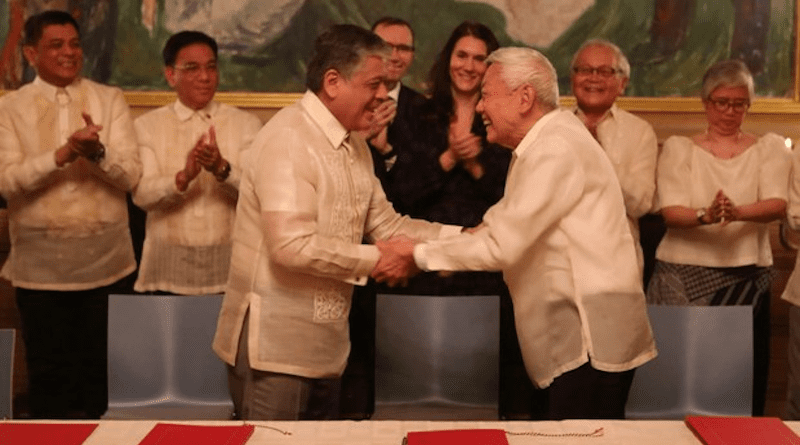Philippines, Communist Rebels Agree To Resume Peace Talks
By BenarNews
By Jojo Riñoza and Jeoffrey Maitem
The Philippines and leaders of the country’s long-running communist insurgency have agreed to resume peace talks after their representatives took part in low-key meetings in Norway, officials from both sides and the Norwegian government confirmed on Tuesday.
Oslo said it facilitated confidential discussions last week that led to the two sides signing an agreement on a “common vision for peace” and committing to re-start formal peace negotiations that were broken off six years ago by then-Philippine President Rodrigo Duterte.
Antonio Lagdameo Jr., special assistant to President Ferdinand Marcos Jr., and Carlito Galvez Jr., Manila’s adviser on the peace process, signed a joint statement to that effect in Oslo on Nov. 23, along with Luis Jalandoni and other representatives of the Communist Party of the Philippines.
In the document, both sides said they recognized “the need to unite as a nation” and seek a solution for ending the 54-year-old conflict – Asia’s longest-running current insurgency – which has left tens of thousands of people dead since 1969.
“The parties agree to a principled and peaceful resolution of the armed conflict. Resolving the roots of the armed conflict and ending the armed struggle shall pave the way for the transformation of the CPP-NPA-NDFP,” the statement said.
It used acronyms for the Communist Party of the Philippines, its military wing, the New People’s Army, and its political wing, the National Democratic Front of the Philippines.
“The parties acknowledge the deep-rooted socioeconomic and political grievances and agree to come up with a framework that sets the priorities for the peace negotiation with the aim of achieving the relevant socioeconomic and political reforms towards a just and lasting peace,” it said.
Philippine military chief Gen. Romeo Brawner Jr. called the resumption of talks good news, according to media reports.
“If this conflict will finally end, your Armed Forces of the Philippines will be able to shift our focus to external or territorial defense,” Brawner said.
CPP spokesman Marco Valbuena said the joint statement was a “first half-step” toward resuming the talks.
“To clear the road for peace negotiations, it is the distinct responsibility of President Ferdinand Marcos to take the initiative to sweep away the Duterte-period thorns and spikes which litter it,” he said.
Marcos, according to Valbuena, can order the release of more than 800 political prisoners as part of a confidence-building measure to create conditions conducive to peace.
Meanwhile on Tuesday, Norway’s top diplomat congratulated the warring parties in the Philippines “on their decision to start formal peace negotiations.”
“This is an important and timely step towards securing lasting peace in the Philippines,” Espen Barth Eide, the Norwegian minister of foreign affairs, said in a news release.
“Extensive work remains and we look forward to continuing to support the Parties in the process towards a final peace agreement,” he said.
Talks canceled
In November 2017, Duterte canceled peace talks with the communists after accusing the NPA of launching deadly attacks in the southern region of Mindanao.
Duterte’s government subsequently blacklisted the CPP-NPA as a terrorist organization and launched offensives against the group which has been waging a Maoist rebellion since 1969.
For its part, the NPA is known for hitting government targets in the countryside.
In November 2022, then-armed forces Chief of Staff Lt. Gen. Bartolome Bacarro, reported that the NPA had about 2,100 fighters scattered across the nation. At its peak in the 1980s, the communist guerrillas had at least 20,000 fighters.
Following the December 2022 death of CPP founder Jose Maria Sison, 83, in the Netherlands, the government has intensified its anti-insurgency campaign.
Earlier this year, Defense Secretary Gilbert Teodoro Jr. said he would not recommend the resumption of talks. It was not immediately clear what caused the apparent change of heart on the side of the Marcos administration.
“To enter into peace talks, I am always against that. Why do we enter into peace talks when they can go back and run for public office? This is really a violation of our democratic processes,” he said in June, according to Philippine media.
“They can’t take up arms and just violate the constitution, the same way we don’t want rightists to also take up arms against the government. It works both ways.”

